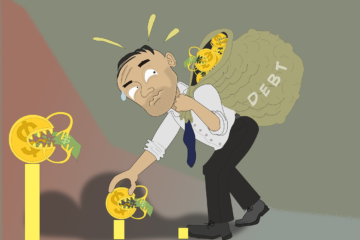Do I pay off debt or invest? This is one of the questions that plagues a lot of us. On one hand, most of us don’t like having a lot of debt and probably want it gone in one way or another. But on the other hand, with the effects of compound interest so great (especially for younger people), you probably don’t want to lose out on compound interest. So let me show you my process with deciding if someone should pay off debt or invest. But please remember, that every situation is unique. These are simply guidelines that I go by.
Note to Those Who HATE Debt
If you hate your debt and just want it out of your life that is awesome! Yes, there are some mathematical calculations to determine if you should pay off debt or invest. But if being debt free makes you sleep better at night and you just can’t stand that you have debt and want to knock it out, do it!
Just know that you may not be going about your financial life as efficiently as you could. For example, if you are 25 and have a 3% (non-mortgage) debt, it makes financial sense for you to pay the minimum payments on that loan and invest anything else you have.
That is because of the effects of compound interest on someone that young. The extra money that you could be paying on something can either be paid on a 3% debt which essentially gets you a 3% rate of return or invested in the market where you would likely earn 8-10%.
The younger you are, the more that your invested money will grow over time.
But with all that being said, regardless of the mathematical calculations, if it makes you feel better to conquer debt first then do it.
Personal finance is personal. Everyone is different and we all have different needs, desires, fears, etc.
What About Mortgages?
When deciding if you should pay off debt or invest, another consideration is what to do with your mortgage.
Here is my rule of thumb:
If you have a mortgage that is LESS THAN 4.00%, just make the minimum payment on it until you are about 50 years old.
One of the best things that you could do in your financial life is to go into retirement debt free. And if you were to retire at a traditional age (65 or so), this will give you about 15 years to knock out the mortgage.
If you are younger than 50 and have an interest rate that is less than 4.00%, don’t worry about the mortgage. Just keep making the minimum payment until you are at least 50.
If you have a mortgage that is GREATER THAN 4.00% then it will depend on your situation.
Personally, I have advised most people in the past to simply make the minimum payment on the mortgage regardless of the interest rate until you are in your 50s.
However, if you find yourself in the situation where you are in your 30s or 40s with a mortgage and interest rate of more than 4.00% AND you are otherwise debt free, it would most likely be wise to add more to your regular mortgage payment.
You don’t have to go “Dave Ramsey” on it necessarily. But an extra couple hundred dollars a month or so WHILE YOU ARE ALSO INVESTING can go a long way.
What to do With Tax Debt
If you have tax debt, you need to move that to the top of your list.
Full stop.
Debt to the IRS can land you in a world of hurt. The IRS has almost unlimited power. You can have your wages garnished, be made ineligible for jobs, or even go to prison.
If you have tax debt, then you need to pay that off ASAP.
Stop investing altogether. Make minimum payments on all other debts. And throw everything you can at your tax debt to wipe it out as quickly as possible.
What to do With Debt to Family Members or Friends
This is a hot take.
In my opinion, you should pay off any debt owed to family members ASAP. Similar to that of tax debt.
If you have both tax debt AND family debt, pay off the tax debt first. Because Uncle Johnny probably won’t throw you in prison for not paying him back but the IRS will
Most family debt is interest free. I get that. But in my opinion, owing money to family members or close friends money can make things uncomfortable. Especially if you fall behind on the payments or life hits you and you are struggling.
Just pay off the money owed to family members and close friends ASAP, even if there is no interest that is being accrued.
What to do With High Interest Debt
Here is where we really get rolling.
If you have high interest debt, regardless of your age, PAY IT OFF.
And just so we are clear, by high interest debt, I mean any interest rate (other than mortgages) that is greater than 7%.
This will include nearly all credit cards, unsecured loans, payday loans, and some car loans.
There is really not a time where you should be holding onto high interest debt. Do what you can to pay it off ASAP.
But that leads us to ask the question: Do I pay off debt or invest if the debt is not a high interest debt?
Do I Pay Off Debt or Invest if I’m in My 20s?
If you are in your 20s, and you have (non-mortgage) debt that has interest greater than 7%, then pay it off instead of investing.
The reason for that is that when you are in your 20s, you have the opportunity for your money to compound GREATLY.
The opportunity cost for paying off debt aggressively in your 20s is missing out on the compounding effect of $1 turning into $88 by retirement.
You probably don’t want to sacrifice that kind of compounding growth to pay off a low interest debt.
Do I Pay Off Debt or Invest if I’m in My 30s?
If you are in your 30s, and you have (non-mortgage) debt that has interest greater than 6%, then pay it off instead of investing.
The reason for the threshold being 6% instead of 7% is because when you are in your 30s, compound interest is not as powerful as it is in your 20s.
Is it still powerful though? ABSOLUTELY!
But because you don’t have as much time for your money to grow, every one dollar invested will likely turn into about $34 by retirement. Not as good as $88 but still really really powerful!
Do I Pay Off Debt or Invest if I’m in My 40s?
If you are in your 40s, and you have (non-mortgage) debt that has interest greater than 5%, then pay it off instead of investing.
Just like the previous two decades, it is still very important to pay off your debt. And because you are not 10 years closer to retirement, the threshold drops.
Compound interest is still very powerful in your 40s. And if you have debt that is less than 5% interest, then invest your extra money instead of aggressively paying down debt.
Do I Pay Off Debt or Invest if I’m in My 50s?
Here is where things can get tricky, and a good financial advisor can help you walk through it.
Once you get into your 50s, you should be shooting to pay off ALL debt, in my opinion.
But it will depend on your situation. If you don’t have any money saved for retirement and you are in your 50s, it is most likely more important for you to save aggressively for retirement. Because what good is a paid for house, car, student loans, etc. if you have no money to live on.
And likewise, what good is a whole bunch of money to live on in retirement if all of your money is eaten away from debt payments.
A good financial advisor can help you walk through this pickle.
But in my opinion, once you get into your 50s, you should be shooting to be debt free by age 60.
Final Thoughts
There are a lot of articles that I write that are more cut and dry than this one. When deciding to pay off debt or invest, there are several considerations that you need to take into consideration.
But these are the guidelines that I use when helping someone decide to pay off debt or invest.
I am here for you!
You can do this!
Until next time!



0 Comments